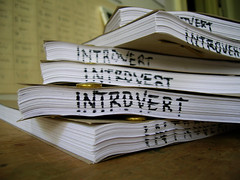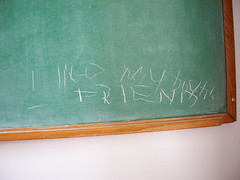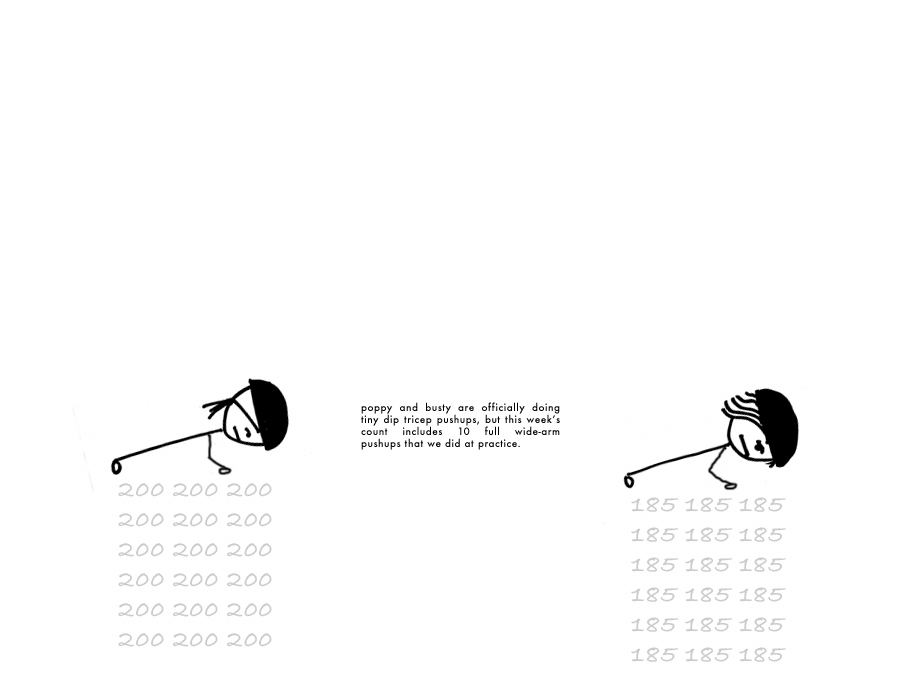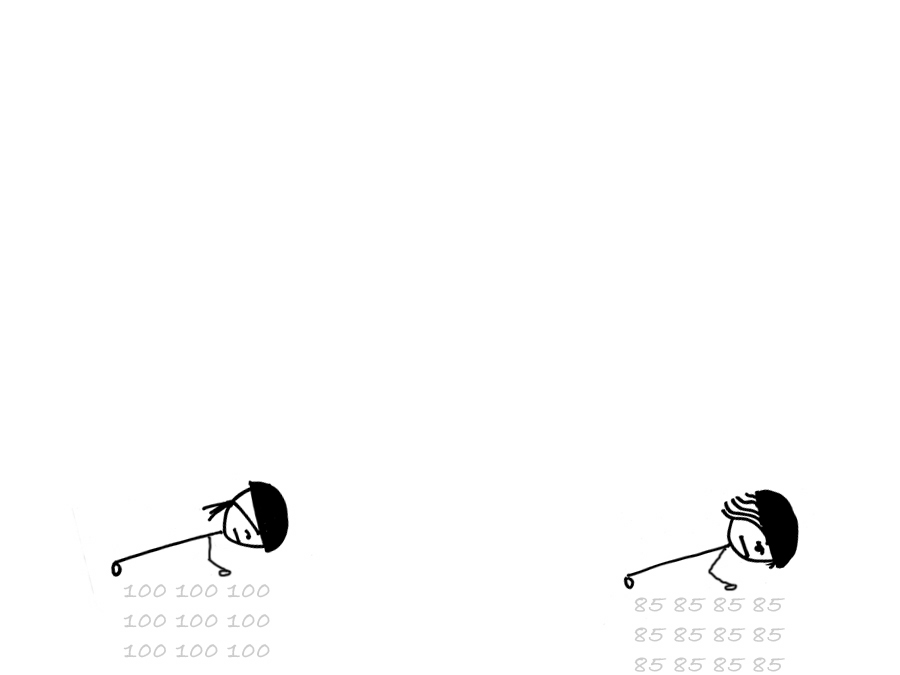Tuesday afternoon, I actually lose track of time and don't leave the office until 5:15 PM. Don't laugh, I don't work late at all; five fifteen is late for me!
I'm supposed to walk home Tuesdays, I'm going to be late for dinner, why hello bus, thank you I will—
This morning on the bus I was reading John Gardner's The Art of Fiction, speaking of lightning that you can pick up with a fork. I love this man. I love this book. I just started the third chapter. I've had this book since 2007, I read the first two chapters two years ago and stopped there: it was enough. I wrote my first screenplay on the power of those two chapters. I've been saving the rest for a rainy day, pathetic fallacy ahoy! Yesterday morning I was depressed, I hate being woken by a thunderstorm. Today I am better, partly because the weather cleared and partly because last night I had a great skate at Orbit and partly because I had this book to read on the bus. And also partly because I have a lovely boyfriend.
This, by the way, is the beginning of the writing process for me. I mean, not the part about the lovely boyfriend. The book, and actually the skating in some ways. Well, maybe the boyfriend too. My first screenplay was all about him. I mean, it's about vampires. But also him.
 Natalie Goldberg in Writing Down The Bones says in her first chapter, "Beginner's Mind, Pen and Paper":
Natalie Goldberg in Writing Down The Bones says in her first chapter, "Beginner's Mind, Pen and Paper":
When I teach a beginning class... I have to come back to beginner's mind, the first way I thought and felt about writing. In a sense, that beginner's mind is what we must come back to every time we sit down and write. There is no security, no assurance that because we wrote something good two months ago, we will do it again. Actually, every time we begin, we wonder how we ever did it before.
Tell me about it, and there's less than no assurance if it was ten months ago. Almost a year. Excuse me while all the air goes out of the room—
This first chapter in WDTB is about what pens and paper to get, which isn't stupid. I am working on that, too. I will write about pens and paper later. Right now I'm thinking with my beginner's mind about the less-thingy thing, you know, the thing that you do with the pens on the paper. Tell what it is again.
Where was I? Oh, right. On the bus.
So I'm on the bus, on the way home. And I take out the Gardner to read more about the thing that you do with the pens on the paper. After dinner, I take out my notebook and write about it. This chapter is "Interest and Truth," and it reads like a plan for how to start a new piece of fiction. By way of illustration, he starts a new piece of fiction about Helen of Troy. What I'm going to do, as an exercise, is write up the plan in my own words, illustrated with zombies, or maybe time travel (more and more I think about time travel), and voila, I will have started my new piece of fiction.
But then I remember that I wanted to google Gilles Deleuze. I know, random. It isn't, though. I sense that something's there for me in Deleuze. Sophie, the girl (remember, I write romantic comedies, "girl" is a technical term) in INTROVERT, was supposed to be doing her dissertation on Deleuze, and I had to cut all those references because half the time I don't understand what he's saying. What I need, really, is Gilles Deleuze Cliff Notes. Anyway, I found this great article on Gilles Deleuze on the The Internet Encyclopedia of Philosophy.
Speaking of tools for writing: Google.
***
I'm supposed to walk home Wednesday, but it's about to thunderstorm and I have to pick up a chicken. I take the bus, again, and copy out Gardner's sentences ("nothing can be made of interest to the reader that was not first of vital concern to the writer," "the writer who denies that human beings have free will is one who can write nothing of interest," and further elaborating on free will as "the capacity to fight for those things they aspire to and avoid those things they fear.") I know from my first read-through that he's going to talk about character, plot, scene, and theme & how to make them come alive.
I think they will come alive if they have a philosophy that informs them. I love philosophy, this is where the on T Logical part of Papillon T Logical comes from. For this I have fixated on Deleuze, like how Samantha Baker thinks she'd give it up to Jake Ryan.
Notably, within his metaphysics he favored a Spinozian concept of a plane of immanence with everything a mode of one substance, and thus on the same level of existence.
You had me at immanence, right? Actually, I got stuck on plane. Wikipedia to the rescue:
Plane of immanence. But here's my stab behind the curtain, immanence is that which exists within. As opposed to transcendence, which is that which exists without. "That which" being God, or let us say life. "Plane of immanence" rejects that opposition, there is no within or without. Everything is within: there is no curtain. We are mostly all postmodern now, so perhaps we take this for granted. Though given this existence of Fox News, this is probably wishful thinking on my part.
So Deleuze eschews 1) transcendence, 2) morality, i.e., judgments of Good and Evil determined by a transcendental mind, in favor of ethicality, i.e., evaluations of good and bad determined on a case-by-base basis. Now you may want to jump in and say, "the way I understand morals versus ethics is..." hold on cowboy, there are any number of ways to understand morals versus ethics, let go of those and wrap your mind around these definitions for the purposes of this discussion. What's wrong with morality: to think in terms of absolute Good and Evil weakens our power to choose, to act, to do... in short, to feel alive. In other words, 3) the unexamined life is not worth living. Whereas to think in terms of relative good and bad for any given situation exercises your powers, and that feels good.
Which I think is exactly what Gardner is saying about free will. Only connect!
And also what I was depressed about earlier this week, if you picked up my geeky reference to "Once More With Feeling" from Buffy The Vampire Slayer's awful Season 6 that I'm totally convinced is a depression narrative:
I don't want to be going through the motions
Losing all my drive
I cant even see if this is really me
And I just want to be alive!
This is what I mean when I talk about the fire's gone out, and trying to keep it going. Let alone Buffy Season 6, I don't wonder if this school of thought that Hell isn't so much fire and brimstone as the absence of God wasn't thought up by manic-depressives. Because that's what depression feels like: God has left the building.
I think I might be okay at writing because I know how that feels, being in the dark and being desperate about getting the lights back on—
 How did I get to be forty-two years old, and I just discovered "weekends"?
How did I get to be forty-two years old, and I just discovered "weekends"?







